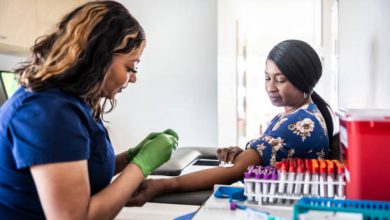9 Biggest Signs of Autism in Black Adults


While many people think autism is usually diagnosed in children, you may be surprised to know how many adults have gone undiagnosed. Though the Centers for Disease Control and Prevention (CDC) states that almost 5 ½ million Americans are living with autism, there are no readily available statistics to show when they were diagnosed. However, there is enough data to suggest that even more Americans haven’t been diagnosed yet – especially if they’re Black.
Why Autism may be Different for Black People
The symptoms of autism can vary wildly, which is why it’s referred to as a spectrum. Most people associate being non-verbal with autism but it’s much more than that. That assumption is valid as up to 40 percent of people with the condition are non-verbal. The remaining 60 percent, however, may have symptoms that go unnoticed even as children. Black children, in particular, were more likely to be seen as being problematic and having behavioral problems. As such, they’re not treated as if they have a medical condition that can be managed.
Unfortunately, for decades many doctors assumed that anyone who wasn’t diagnosed with autism as a child must not have the condition. The result is that adults with autism have gone on to tackle their condition on their own. Some have been able to live fulfilling lives while statistics show that up to 75 percent of autistic people are either under- or unemployed. Furthermore, a lot of them have co-occurring mental health conditions.
9 Signs of Autism in Black Adults
1. Feeling Different
While it’s common for some people to feel like they don’t belong at one point in their lives, people with autism always feel that way. They notice that they react differently to situations and don’t have the same conversations as those around them.
2. Not Recognizing Social Cues
People with autism have a hard time determining appropriate reactions to others. You may not know how long to hold eye contact, when to smile, how long to laugh, or the right thing to say.
3. A Complicated Relationship History
Autism can make relationships difficult for several reasons – including issues with social cues and communication. In many cases, you may not understand why your romantic, platonic, or professional relationships end.
4. Sensory Issues
Things like noise and light can bother or even overwhelm someone with autism. This can include constantly hearing the clock’s ticking or the refrigerator’s hum. If you have autism you may flinch from sounds that other people ignore easily like an alarm, siren, or a screaming child.
5. Needing Routine
Those who have autism find comfort in knowing how their days are going to play out. Conversely, they may have a meltdown or get angry when their routine is disrupted. As an adult, you may seek out jobs that revolve around a routine and resist seeking a different one.
6. Seeking Alone Time
When you grow into adulthood with autism, many adults develop masking techniques that help them to fit in. These techniques may be effective but they’re also exhausting. As a result, you usually need a lot of time by yourself to recover.
7. Passionate Interests
There’s nothing wrong with having hobbies but people with autism tend to be intensely passionate about their interests. Not only do they dedicate a lot of time to them but they also find ways to incorporate them into conversations regardless of what’s being discussed.
8. Hating Small Talk
Many people with autism dislike and avoid small talk. Since they prefer deeper conversations, they may be quiet in a group or try to steer the conversation elsewhere. They may also stick to talking to people they already know so there’s no need for small talk.
9. Needing Direct Communication
This can go hand in hand with not recognizing social cues. People with autism tend to be more literal in their thinking and so there can be miscommunications if others are depending on them to read for words that haven’t been said. That’s why you may thrive when the people you’re talking to are straightforward in their communication.
RELATED: 15 Things Everyone Should Know About Autism
How to Get a Diagnosis
Understandably, you might have some reservations about seeing a doctor about an autism diagnosis. The good thing is that there are more resources available now than in the years before. Before the 1980s, the criteria that needed to be satisfied for an autism diagnosis were limited. Once they were expanded, the number of children who were diagnosed increased by over 70 percent. Interestingly, some adults started the steps toward a diagnosis while their children were being assessed because they recognized the symptoms.
A good place to start is a reputable online assessment. Even if your symptoms don’t significantly disrupt your life, having a diagnosis can help you pinpoint the coping mechanisms you need to manage your condition. Some organizations will offer aid and therapy based on an online assessment alone but others require an official diagnosis. In that case, the assessment is still a good starting point because the person doing the evaluation can see the issues you’re dealing with. This approach is helpful as many adults seeking a diagnosis report being too nervous to adequately describe their symptoms during a face-to-face evaluation.
When looking for a therapist, it’s best to find one that specializes in diagnosing autism in adults. It’s even better if they have worked with Black Americans as well.




